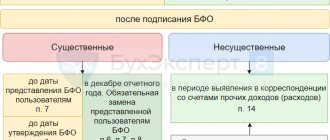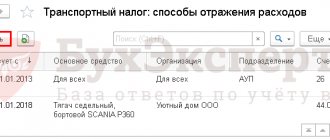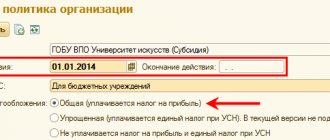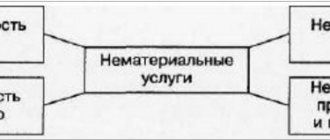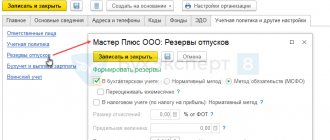Theoretically, the dates on which the primary documents were issued and the dates on which the corresponding business transactions are reflected in the accounting records should coincide. But in practice, there are often cases when goods, work or services are actually accepted in one period, and the documents for them (invoices or acts) are received in another. As a result, the organization is aware of the actual expenses incurred, but there are no grounds for reflecting them in accounting (both accounting and tax). The situation becomes especially confusing when we are talking about different tax periods. We believe that every taxpayer has encountered a similar problem at least once in their life, therefore, ways to solve it are of interest to a wide range of readers.
The situation under consideration is not directly regulated by the Tax Code. And this, in turn, indicates the presence of at least several ways to account for expenses, the supporting documents for which were received by the taxpayer late. We will consider each of them, as well as their pros and cons, in detail.
Adjustment of the tax base of the previous period
This option is completely legitimate and complies with the provisions of tax legislation, in particular paragraph 1 of Art. 54 and paragraph 1 of Art. 272 Tax Code of the Russian Federation .
Let us remind you: the procedure for recognizing costs using the accrual method is determined by clause 1 of Art. 272 , according to which expenses accepted for tax purposes taking into account the provisions of Chapter. 25 of the Tax Code of the Russian Federation , are recognized as such in the reporting (tax) period to which they relate, regardless of the time of actual payment of funds and (or) other form of payment and are determined taking into account Art. 318 – 320 Tax Code of the Russian Federation . In other words, expenses are recognized in the reporting (tax) period in which they arose based on the terms of the transaction. This is the so-called general principle of cost recognition for income tax purposes. As the Federal Antimonopoly Service emphasized in Resolution No. A72-5678/2011 , this principle does not give the taxpayer the right to arbitrarily choose a tax period to reflect expenses.
Based on the above principle, a taxpayer, having received documents late, must adjust the tax base for the income tax of the previous period by the amount of expenses incurred (and, accordingly, the amount of tax payable) and submit an updated declaration to the inspectorate.
The following arguments can be given in favor of this method of reflecting expenses previously not taken into account when taxing profits. Tax accounting is a system for summarizing information to determine the taxable base for income tax based on data from primary documents, grouped in accordance with the procedure provided for by tax legislation (Article 313 of the Tax Code of the Russian Federation ). If primary documents (regardless of their format - paper or electronic) are missing, then there is no possibility of accounting for costs incurred for tax purposes. As a result, the taxable base reflected in the tax return for the period when the expenses were actually incurred by the taxpayer turns out to be overestimated. As a result, the amount of tax calculated and declared for payment to the budget for this period is also overestimated.
Condition three: in the current tax period it is necessary to show profit
This condition was put forward by the Ministry of Finance in a letter dated 04/06/20 No. 03-03-06/2/27064. The authors once again recalled the content of paragraph 1 of Article of the Tax Code of the Russian Federation - correction of an error in the reporting period is possible only if there was an excessive payment in the previous period.
And then the officials made an unexpected conclusion:
“Thus, an organization has the right to include in the tax base of the current reporting (tax) period the amount of an identified error (distortion), which led to the excessive payment of corporate income tax in the previous reporting (tax) period, only if in the current reporting ( tax period, profit was made."
Financial department specialists did not say what this statement is based on.
Controllers with both hands “for”
Local tax authorities (as evidenced by examples from arbitration practice) often insist on precisely this method of recognizing the expenses in question in accounting. They justify their demands by reference to the provisions of paragraph 1 of Art. 54 of the Tax Code of the Russian Federation (which corresponds to clause 1 of Article 272 of the Tax Code of the Russian Federation ), which determines the procedure for correcting the tax base in the event of detection of errors and inaccuracies relating to previous periods.
We believe that to a large extent, such categoricalness of the controllers was influenced by the explanations given in the Letter of the Federal Tax Service of Russia dated August 17, 2011 No. AS-4-3/13421 . Let us recall that in it, tax department specialists came to the conclusion that a taxpayer may not submit an amended return only when the period of occurrence of the error is not clear. With regard to documents received late, there can be no such ambiguity, since the period when the costs were incurred is determined.
It should be noted: there are judicial acts in which the arbitrators agree with this position of the controllers. For example, the judges of the Federal Antimonopoly Service of North Kazakhstan, in Resolution No. A15-1905/2012 , 2013, came to the conclusion that the reflection in the tax base of expenses incurred, the confirmation documents for which were not received before the reporting deadline, is carried out by submitting an updated declaration. A company can attribute expenses to the period of their identification (receipt of documents from counterparties) only if the period of occurrence of the expenses incurred is not known.
It is also appropriate to add here that tax inspectors often appeal to the conclusions made in the Resolution of the Presidium of the Supreme Arbitration Court of the Russian Federation dated 09.09.2008 No. 4894/08 (hereinafter referred to as Resolution No. 4894/08 ), according to which expenses related to past periods are subject to reflection in the tax accounting in compliance with the requirements of Art. 54 and 272 of the Tax Code of the Russian Federation . Meanwhile, the dispute in the said judicial act arose over episodes related to the additional assessment of income tax on non-operating expenses for the period from 2001 to 2003. In other words, the conclusions of the senior arbitrators were made in relation to legal relations regulated by the previous wording of paragraph 1 of Art. 54 of the Tax Code of the Russian Federation (before amendments were made to it by Federal Law No. 224-FZ ), which was applied until January 1, 2010. Therefore, reference to the mentioned judicial act when considering controversial situations that arose after this date is, to put it mildly, incorrect.
A similar conclusion was made in the Resolution of the Ninth Arbitration Court of Appeal dated October 23, 2013 No. 09AP-33336/2013 .
So, by choosing this method of recording expenses based on late supporting documents, the taxpayer will most likely avoid claims from regulatory authorities.
"A spoon of tar"
At the same time, it should be noted that the above option for reflecting expenses has one significant drawback. The fact is that filing an updated declaration with a smaller amount of tax payable to the budget, in addition to a desk audit (conducted in the manner established by Article 88 of the Tax Code of the Russian Federation ), can provoke an on-site audit.
The validity of this statement is confirmed by the recommendations of Federal Tax Service specialists on conducting on-site inspections ( clause 1.3.2 of Letter No. AS-4-2/13622 ). It follows from this document that the tax authority, as part of an on-site audit, has the right to check the period for which the updated declaration was submitted (even if this period exceeds three calendar years preceding the year in which such a declaration was submitted). An exception is the case when the corresponding period was previously covered by an on-site inspection (see also Letter of the Federal Tax Service of Russia dated May 29, 2012 No. AS-4-2/8792 ).
Thus, by submitting an amended return in which the amount of income tax payable to the budget is reduced, the taxpayer risks that an unscheduled on-site tax audit may be assigned to him. Let us add that this risk increases in the case of repeated clarification of information for the same period.
At the same time (as mentioned above), adjusting the tax base of the previous period is far from the only way to reflect previously unrecognized expenses in accounting.
The implementation was not reflected on time - how to fix it?
Published 01/09/2020 11:05 Author: Administrator Everyone encounters errors when keeping records, because those who do nothing make no mistakes. But even experienced accountants are sometimes perplexed by questions about how to correct the situation. For example, the contract department spent a long time agreeing on a contract with the buyer and eventually approved it “retroactively.” What should an accountant do if the reporting period is already closed? Let's use a practical example in 1C: Accounting to understand how to correct such an implementation in accounting and tax accounting.
So, let’s say that the accounting department of Button LLC (uses OSN) for some reason “forgot” to reflect the sales of Magister LLC in the amount of 480,000 rubles in the 1st quarter of 2021 (03/31/2019). And they discovered this in December 2021, i.e. in the same year, but in a different reporting period. At the same time, in the first quarter and half of 2019, according to tax accounting data, a loss of more than 500,000 rubles was received.
First, let's figure out how to correct the situation in accounting. The main document regulating the correction of errors in accounting is PBU 22/2010 “Correcting errors in accounting and reporting” (approved by order of the Ministry of Finance dated October 28, 2010 No. 63n). According to this document, the implementation in our example should be reflected with the current date.
Then we correct the tax accounting data for VAT - you need to submit an updated declaration and pay an additional amount of tax to the budget. To do this, register the invoice in the sales book (the document will be automatically registered with the current date):
When posting a sales document, the program will generate movements in the accounting accounts:
And movements in the registers “VAT Sales” and “Sales of Services”
As you can see, the “VAT Sales” register after posting the document contains an entry with the current date, i.e. the fourth quarter of 2021. We need to adjust the VAT for the 1st quarter of 2021, make additional payments. sheet in the sales book and submit an updated value added tax return. To do this, you will need to make changes to this register manually. Check the “Manual adjustment” checkbox, select “Yes” in the “Record additional sheet” column, and select the desired date in the “Adjusted period” column:
Let's create a sales book:
When generating a report for the current quarter, the program will display the following message:
“In the specified reporting period, changes were made to previous tax periods.
Additional sheets for adjusted tax periods in which changes have been made can be built in the current report.
To do this, you need to select the “Generate additional sheets” checkbox and select the value “for the adjusted period.”
Let's use this advice and set the necessary settings:
The program will generate an additional sheet of the sales book for the 1st quarter of 2021:
All that remains is to create and fill out a corrective VAT return; on the title page you need to indicate the number of the adjustment and the date the report was filled out (must be later than the date the sales document was entered).
What to do with the income tax return?
Since, according to the conditions of our example, a loss was made on income tax in the first quarter and half of the year, in this case we do not pay advances on tax, and accordingly, we are not required to submit an updated declaration.
However, after submitting an updated value added tax return, sales proceeds in VAT and income tax reports will no longer coincide:
Page 010 + Page 100 of Appendix No. 1 to sheet 02 Income tax returns ≠ Page 010 gr. 3 section 3 for all quarters from the beginning of the year VAT returns
Therefore, after submitting a VAT return, there is a possibility of receiving a message from the tax authorities demanding an explanation of the reasons for such a discrepancy (subclause 4, clause 1, article 31, clause 1, article 82, clause 3, article 88 of the Tax Code of the Russian Federation). The period within which explanations must be given is 5 working days from the day following the day of receipt from the tax authorities of a message requesting their submission. Tax officials suggest using the recommended form of explanations for these purposes (letter of the Federal Tax Service of Russia dated 04/07/2015 No. ED-4-15 / [email protected] ), but you can also submit them in any form.
In the event that a tax profit would have been received during the period of the error, it would also be necessary to submit an updated profit declaration and make additional advance tax payments to the budget.
Author of the article: Anna Kulikova
Did you like the article? Subscribe to the newsletter for new materials
Add a comment
Comments
0 Irina Plotnikova 03/04/2021 07:05 I quote Yulia Vinogradova:
Hello! The article is, of course, interesting. But the Federal Tax Service requires us to make changes in the quarter when the SF should have been taken into account. And submit the corr. report for 1 quarter sales book with the sign “data is unreliable”, and not additional. leaf. Therefore, the question arises: in what period after retaking the VAT must the NDP be retaken?
Julia, good day.
Ask your inspectors what legal provisions they are referring to? Quote 0 Yulia Vinogradova 03/02/2021 11:11 Hello! The article is, of course, interesting. But the Federal Tax Service requires us to make changes in the quarter when the SF should have been taken into account. And submit the corr. report for 1 quarter sales book with the sign “data is unreliable”, and not additional. leaf. Therefore, the question arises: in what period after retaking the VAT must the NDP be retaken?
Quote
+6 Elena 01/21/2020 14:31 Hello! Why in the example is the invoice dated December? In theory, documents that are late should be dated specifically to the first quarter?
Quote
Update list of comments
JComments
Non-operating expenses
If we are talking about “late” documents for non-operating or other expenses (as a rule, these are costs associated with paying third-party organizations for work or non-production services), then a special rule established in paragraphs. 3 paragraph 7 art. 272 Tax Code of the Russian Federation . Let us remind you that this provision provides for the taxpayer’s right to choose a specific method of accounting for expenses (including those confirmed by “late” documents). This may be (unless otherwise established by Articles 261 , 262 , 266 , 267 of the Tax Code of the Russian Federation ):
- settlement date in accordance with the terms of concluded agreements;
- the date of presentation to the taxpayer of documents serving as the basis for making calculations;
- the last day of the reporting (tax) period - for expenses in the form of commission fees, costs of paying third parties for work performed (services provided), rental (leasing) payments for rented (leased) property, as well as other similar expenses.
The fairness of this approach is confirmed by the conclusions of the arbitrators made in the resolutions of the FAS North-West District dated 06/05/2012 No. A44-3816/2011 , FAS North-West Region dated 02/22/2012 No. A53-11894/2011 . And FAS MO in Resolution No. A40-54227/12-90-293 clarified: in tax legislation there is no obligation for the taxpayer to record his choice of the date of non-operating and other expenses in the form of costs for paying third parties for the services they provide in the accounting policy for tax purposes. If the taxpayer recognizes the costs of paying for such work not at the time of signing the act, but during the period of payment for the service provided, these actions fully comply with the requirements of paragraphs. 3 paragraph 7 art. 272 Tax Code of the Russian Federation .
Significant point: In subclause 3 of clause 7 of Art. 272 refers to the presentation of documents. The concept of “present” in explanatory dictionaries of the Russian language means “show in confirmation.” In other words, the use of the concept of “presentation” in relation to documents indicates that these documents can be seen with one’s own eyes. That is, we are talking about the date when the documents were actually received by the taxpayer. This is exactly how the mentioned concept is interpreted in law enforcement practice (see, for example, resolutions of the Federal Antimonopoly Service of the Moscow Region dated August 14, 2013 No. A40-110013/12-20-566 , Federal Antimonopoly Service of the North-West Zone dated January 31, 2011 No. A56-10165/2010 ).
Officials of the Ministry of Finance, in turn, often replace the concepts in this norm. For example, in Letter No. 03-03-06/1/774 , financiers indicated that the date of presentation to the taxpayer of documents serving as the basis for making calculations should be understood as the date of preparation of these documents. Agree, there is a difference between drafting and submitting documents, and a considerable one.
Production costs
When considering the issue of a special procedure for recognizing expenses for profit tax purposes, one cannot fail to mention clause 2 of Art. 272 of the Tax Code of the Russian Federation , which determines the procedure for recognizing expenses for payment for work and services of a production nature .
Let us remind you that such expenses are recognized in tax accounting on the date the customer signs the acceptance certificates for work and services. In this case, the taxpayer is not given the right to choose a specific method of accounting for material costs. At the same time, to include the cost of work (services) in tax expenses, a primary document is required, on the basis of which these works will be accepted for accounting. Therefore, obtaining information about costs that was not available to the taxpayer at the time of drawing up the declaration does not give rise to the taxpayer’s obligation to adjust the tax base of the previous period by filing an updated declaration.
As stated in the previously mentioned Resolution of the Ninth Arbitration Court of Appeal No. 09AP-33336/2013 , in a situation where we are talking about “late” documents, a special rule is subject to application - clause 2 of Art. 272 of the Tax Code of the Russian Federation , and the tax inspectorate’s reference to the general procedure ( clause 1 of Article 272 of the Tax Code of the Russian Federation ) and to the provisions of Art. 54 of the Tax Code of the Russian Federation , which talks about detected errors and distortions (that is, about reflecting expenses in the absence of primary documents), is unlawful.
An invoice for the advertising service provided is created by clicking on the Write invoice at the bottom of the “Sales (act, invoice)” document.
In the “Invoice issued” document, which can be opened via a hyperlink, all fields are filled in automatically based on the data in the “Sales (act, invoice)” document. Therefore, in the line with the details of the invoice “from” and in the line “Issued (transferred to the counterparty)” the date of the document “Sales (deed, invoice)” will be indicated, that is, 10/27/2019.
ATTENTION! If in the accounting system the documents “Sales (act, invoice)” and “Invoice issued” were already created in a timely manner, on September 29, 2021, but due to an error, these documents remained not posted, then the taxpayer will have to independently, based on professional judgments, decide on what date to post previously created documents, i.e. whether to change the date of the document “Sales (act, invoice)” from 09/29/2019 to 10/27/2019 before carrying out the transaction. It is necessary to take into account that if the buyer has already been issued an invoice with the date 09.29.2019, then in the document “Invoice issued” the date of issue should not be changed to 10.27.2019. Otherwise, the registration entry in the seller’s sales book will not correspond to the registration entry in the buyer’s purchase book, which will lead to a discrepancy in the indicators of sections 8 and 9 of the counterparties’ tax returns.
The updated VAT return for the 3rd quarter of 2019 will include the same sections as the initial return. In this case, the title page of the declaration will indicate the adjustment number “1” and the signature date of 10/27/2019.
In section 3 of the updated tax return, line 010 will reflect the tax base and the amount of calculated tax, including the transaction for the provision of services.
In addition, the updated declaration will additionally contain Appendix 1 to Section 9, which will reflect information from the additional sheet of the sales book. Since there was no such information in the primary declaration, the line “Previously submitted information” will be marked as Irrelevant , which corresponds to the relevance indicator “0” and means that in the previously submitted declaration this information under Section 9 was not provided (clause 48.2 of the Procedure for filling out the tax VAT returns).
Since no changes were made to the sales book itself, the information from Section 9 does not need to be re-uploaded to the tax office, for which it is enough to check the box in the “Previously submitted information” line in the field Relevant , which corresponds to the relevance sign “1” and means that the information , previously submitted by the taxpayer to the tax authority, are current, reliable, cannot be changed and are not submitted to the tax authority (clause 47.2 of the Procedure for filling out a VAT return).
Thus, even operations that were not carried out, or completely forgotten, we can reflect correctly and submit an updated declaration.
What if you recognize it as a loss?
Expenses not previously taken into account (due to the lack of supporting documents) can be qualified as losses from previous periods that were identified in the current tax period.
True, this method does not exclude disputes with regulatory authorities (remember, they insist on the need to adjust the tax base of the previous period). In addition, from the Letter of the Ministry of Finance of Russia dated December 28, 2010 No. 03-03-06/1/814 , it follows that the taxpayer must record previously unrecognized expenses under the same item and group of expenses (material expenses, wages or non-operating expenses) , according to which they are taken into account in case of timely receipt of documents.
What are the organization’s chances of defending its interests in this case (including in court)? It is quite difficult to predict the outcome of such a dispute in advance, since judicial practice in this regard is very contradictory.
For example, in Resolution No. A65-6652/2010 , the FAS PO arbitrators considered the actions of the taxpayer correct, who, guided by paragraphs. 1 item 2 art. 265 of the Tax Code of the Russian Federation , previously unaccounted expenses were reflected in non-operating expenses as losses of previous tax periods identified in the current tax period. Despite the fact that the dispute considered in the case concerns the recognition of expenses in 2008, the arbitrators applied clause 1 of Art. 54 of the Tax Code of the Russian Federation as amended, effective from January 1, 2010. Motivating their actions, the judges referred to paragraph 3 of Art. 5 of the Tax Code of the Russian Federation , according to which acts of legislation on taxes and fees that establish additional guarantees for the protection of taxpayers’ rights have retroactive effect without special instructions.
True, later the Federal Antimonopoly Service ( Resolution No. A65-30248/2012 ) came to the conclusion that the provisions of paragraphs. 1 item 2 art. 265 of the Tax Code of the Russian Federation are subject to application in the current tax period only if the period of occurrence of expenses incurred by the taxpayer is unknown. In all other cases, expenses related to previous tax periods are subject to reflection in tax accounting in compliance with the requirements of Art. 54 and 272 of the Tax Code of the Russian Federation . (The reason for the change in the position of the arbitrators of this district is also indicated here - Resolution No. 4894/08 .)
Of interest is also the Resolution of the Federal Antimonopoly Service of the Moscow Region dated July 5, 2013 No. A40-122173/12-20-621 , which considered a similar episode (documents on previously incurred expenses were received in 2008 and 2009). Making a decision in favor of the tax authority (with reference to Article 54 (as amended before 01/01/2010), 272 of the Tax Code of the Russian Federation and, of course, Resolution No. 4894/08 ) and canceling the decisions of lower authorities (which decided in favor of the taxpayer), the arbitrators decided: the taxpayer does not have the right to take into account as losses from previous years expenses identified in the current year associated with ordinary business activities.
In making such conclusions, the judges nevertheless noted that the case materials do not contain documents confirming the later receipt of primary documents.
Perhaps, if the taxpayer had bothered about this evidence in time, the outcome of the dispute would have been different. However, this cannot be said for certain. But! The mentioned clause from the Resolution of the Federal Antimonopoly Service No. A40-122173/12-20-621 once again convinces us that such evidence is very useful in disputes about the period for reflecting previously unaccounted expenses. Consequently, taxpayers need to worry about preparing this kind of documents (for example, logs of incoming correspondence) in advance.
So, taking into account the above, we can conclude: the procedure for recognizing in tax accounting expenses confirmed by “late” primary documents cannot be universal. The choice of the period for reflecting previously unaccounted expenses (and, as a consequence, the need to adjust the taxable base for income tax) directly depends on the specific type of expense. At the same time, the taxpayer must weigh the negative consequences of each of the possible options, as well as assess the likelihood of a legal dispute with controllers. And here it is important to clearly understand what is an error for tax purposes and what is not.
Invoice is late...
The document was received before the 25th day of the month following the end of the quarter.
The main conditions for deducting input VAT are as follows:
- goods (work, services, property rights) are accepted for accounting on the basis of primary documents;
- goods (work, services, property rights) are intended for use in activities subject to VAT;
- The corresponding invoice has been received from the supplier.
From January 1, 2015, upon receipt of an invoice after the end of the quarter, but before the deadline for submitting the declaration for this period (i.e., before the 25th of the next month), the buyer has the right to claim a VAT tax deduction for the period of acceptance of goods (works, services, property rights) for accounting (paragraph 2, clause 1.1, article 172 of the Tax Code of the Russian Federation, letter of the Ministry of Finance of Russia dated 02.02.2016 N 03-07-11/4712).
For example, if a product was accepted for accounting on March 20, but the seller’s invoice was received only on April 20, then the buyer has the right to claim VAT for deduction in the declaration for the 1st quarter.
Events
Peculiarities of calculation and payment of wages, including those working remotely
June 10, 2021 at 14:00
The document was received after submitting the declaration for the past quarter
In this case, the taxpayer has the right to use paragraph. 1 clause 1.1 art. 172 of the Tax Code of the Russian Federation and declare a tax deduction for purchased goods (works, services, property rights) in any quarter within three years after they are registered.
However, according to the Ministry of Finance and the Federal Tax Service, such a right arises for the taxpayer only when purchasing goods (including imported), works, services or property rights, that is, in relation to the deductions established by clause 2 of Art. 171 Tax Code of the Russian Federation. And for VAT deductions, for which a special application procedure has been established, the provisions of clause 1.1 of Art. 172 of the Tax Code of the Russian Federation do not apply.
For example, you cannot independently choose the period for a tax deduction in the following cases (letter of the Federal Tax Service of Russia dated April 13, 2016 N SD-4-3 / [email protected] , letters of the Ministry of Finance of Russia dated April 26, 2016 N 03-07-08/24230, dated April 9 .2015 N 03-07-11/20290, dated 07/21/2015 N 03-07-11/41908, dated 10/09/2015 N 03-07-11/57833):
- upon receipt as a contribution (contribution) to the authorized (share) capital (fund) of property, intangible assets and property rights, the VAT upon transfer of which was restored by the shareholder (participant, shareholder) (clause 11 of Article 171 of the Tax Code of the Russian Federation);
- for VAT paid by the buyer - tax agent (clause 3 of Article 171 of the Tax Code of the Russian Federation);
- according to VAT calculated by the seller from advances received for future deliveries of goods (work, services, property rights) (clause 8 of Article 171, clause 6 of Article 172 of the Tax Code of the Russian Federation);
- for VAT presented to the buyer when he transfers advances to the seller on account of upcoming deliveries of goods (work, services, property rights) (clause 12 of article 171 of the Tax Code of the Russian Federation);
- on VAT paid by the seller to the budget from advances received in the event of a change in conditions or termination of the relevant contract and the return of advance payments (clause 5 of Article 171 of the Tax Code of the Russian Federation).
- when exporting goods and for works and services, the sale of which is taxed at a rate of 0% (clause 3 of Article 172 of the Tax Code of the Russian Federation).
Thus, if an invoice is late, for example for advances paid to the seller, the three-year VAT deduction rule does not apply. In this case, you need to submit an updated declaration for the previous period.
The rule of paragraph 1 of Article 54 of the Tax Code of the Russian Federation on the correction in the current period of errors that led to overpayment of tax in the past does not apply in the event of incorrect calculation of VAT. VAT errors (distortions) are corrected only during the period when they were committed (letter of the Ministry of Finance dated August 25, 2010 N 03-07-11/363).
Find out if you are subject to mandatory audit
according to your situation and get advice from an auditor.
Request a call
Request a call
